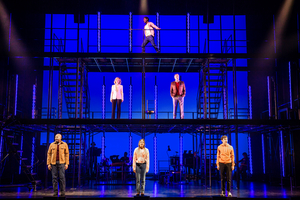Review: NEXT TO NORMAL at Kennedy Center

Photo by Jeremy Daniel.
Everyone once in a while a project is announced that basically sounds fool proof. The latest entry into Kennedy Center's Broadway Center Stage series Next to Normal is definitely one of those projects.
The Broadway Center Stage series says it presents "semi staged" concert versions of known and lesser known musicals. If you think about it, Next to Normal is already kind of a staged concert. In its original staging the band was in full view and the show utilizes minimal props and furnishings. This minimalistic approach along with the awe inspiring Tony Award winning performance of Alice Ripley helped the show win a Tony Award for best score (beating out Elton John's score for Billy Eliott mind you) and the esteemed Pulitzer Prize for Drama. Tom Kitt's music and Brian Yorkey's book and lyrics were handled with class and care by the show's director Michael Greif and Sergio Trujillo's choreography never impinged on the deep and moving story.
In this current staging at Kennedy Center Greif, Trujillo, the show's original music director Charlie Alterman and the show's original costume designer Jeff Mashie have all returned but the final product, at least for me, wasn't the same this time around.
Mark Wedland's set as adapted by Paul Tate dePoo III is almost identical to his original with a few modifications. The most noticeable is the band is now on the floor behind the set. Whoever thought it was a good idea to hide drummer/percussionist Shannon Ford (the Broadway production's second drummer who is currently playing Beetlejuice) in a plexiglass cage and behind a black drape ought to have his/her head examined. This is a rock score in many spots. Please don't hide or try to contain the foundation of the band.
Another issue I have with this version is the overwrought lighting of Cory Patrick. The overabundance of flashing lights when not needed became more of a distraction than an enhancement. If the choice was to make all the flashing effects symbolize what was happening inside Diana's (Rachel Bay Jones) head as she fights bi-polar disorder it was a misguided one. I even noticed a programming mistake in the color wash for the final song "Light".
The performances range from very good to not so hot. Rachel Bay Jones as Diana has an impossible task to be sure. For those of us that saw Alice Ripley's performance nothing is going to top what she did with that character. Our dearly departed Marin Mazzie replaced Ripley on Broadway and while she sang the show brilliantly I missed the manicness of Ripley's portrayal. I rate Bay Jones' performance on par with Mazzie's. She has a big and lovely sounding voice and nails "I Miss the Mountains" which is the song where Diana decides she doesn't need her meds anymore and is tired of living in a drug induced haze. Because of the lack of manicness in the early sections when Diana finally realizes what she has to do at the end the change isn't as dramatic as it should be. As previously stated Bay Jones, as good as she is as a performer can't win.
Bay Jones also deserves credit for having to play against the underwhelming performance of Brandon Victor Dixon as Diana's husband Dan. The character is written to be a man, while doing what he can to hold his family together he is very much into himself and his work. The conflict for me was always if Dan truly cared for Diana or if by sending her to therapists and later on electroconvulsive therapy (ECT) was a way for him not deal with her problems and be all about him. For whatever reason, in this version I did not feel the tension or the urgency of a wanting for a quick fix in Dixon's performance.
I am all for introducing new talent whenever possible but there has to be something there to begin with. Gabe is the son Diana lost at a very young age due to an undiagnosed intestinal condition. This event contributed to Diana's downward spiral. The point of the character is just because someone goes away doesn't mean you totally forget about them. Diana has conversations with Gabe and Dan by getting Diana ECT in an attempt to wipe out all memories of Gabe is as cruel as you can get.
Newcomer Khamary Rose simply doesn't have the experience as a stage performer (his credits are all TV and film) to pull his portrayal of Gabe off. His big solo number "I'm Alive" which usually stops the show doesn't come close. Maybe with more rehearsal time his performance would have been stronger.
Maia Reficcio as Diana and Dan's daughter Natalie fares a little better than Rose but for me her performance doesn't convey the angry teenager that Natalie truly is. After all, she has been overshadowed by Diana's condition pretty much her whole life.
As Natalie's persistent suitor Henry Ben Levi Ross gives one of the stronger performances. His unwavering support of Natalie is astonishing. No matter how many times Natalie pushes him away he won't give up.
Michael Park as both Dr Madden and Dr. Fine does well enough but by casting an older actor in these parts the rock-star gag doesn't nessecarrlly have the same effect.
Vocally much of the show sounds fantastic due in part to the solid musical direction of Charlie Alterman who also leads the full six piece (including the impossible to find violin/synthesizer double)Michael Starobin and Tom Kitt orchestration to audible bliss. Let us not forget two musicians that made enormous contributions to the show's musical development. The show's original drummer/percussionist Damien Bassman wrote the drum/percussion arrangements and Michael Aarons provided additional guitar arrangements. While Starobin and Kitt are the credited orchestrators let's give credit where it is deserved.
I guess the big question for me is what went wrong with this staging of Next to Normal. Is it that with limited rehearsal Michael Greif ran out of time to get the best performances out of his cast? Is it that once the company hit the stage of the Eisenhower they had even less time to develop because of all of the technical elements thrown at them? Maybe it's a combination of both.
If you have never seen a performance of Next to Normal you might have a different response to this production than I did. To quote two of Brian Yorkey's lyrics, I went in thinking "It's Gonna Be Good" but came out saying "I miss the pain".
Running Time: Two hours and fifteen minutes including one intermission.
Next to Normal runs through February 3 2020 in the Eisenhower Theatre at Kennedy Center which is located at 2700 F St NW, Washington, DC.
For tickets, click here.
Videos

